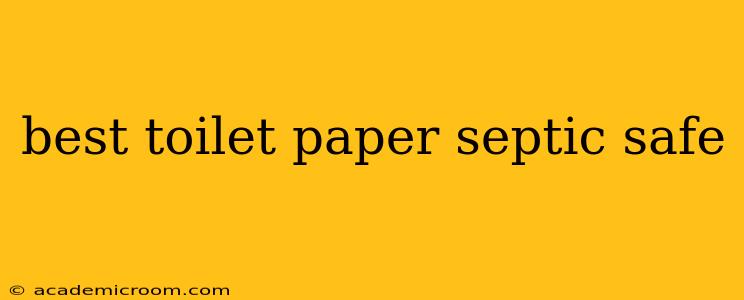Choosing the right toilet paper is crucial for maintaining a healthy septic system. Using the wrong kind can lead to costly clogs and repairs. This guide will help you navigate the world of septic-safe toilet paper, answering common questions and providing recommendations for making an informed choice.
What Makes Toilet Paper Septic-Safe?
The key to septic-safe toilet paper lies in its rapid disintegration rate. Unlike conventional toilet paper, which can clump and cause blockages, septic-safe options are designed to break down quickly in your septic tank. This breakdown process is essential for preventing clogs and ensuring the efficient operation of your septic system. Look for toilet papers specifically labeled as "septic-safe" or "dissolves quickly." These usually use different pulps and manufacturing processes to achieve this rapid disintegration.
How to Choose Septic-Safe Toilet Paper: Key Factors
Several factors contribute to a toilet paper's septic-safety:
-
Fiber Type: Look for toilet paper made from 100% recycled paper or virgin fiber with a high absorbency rate. Avoid toilet papers with high levels of additives, dyes, or fragrances, as these can interfere with the breakdown process.
-
Ply Count: While higher ply counts often mean greater softness, they can also contribute to slower disintegration. Consider a balance between softness and septic safety; a single-ply or two-ply septic-safe option might be a better choice than a thicker, multi-ply alternative.
-
Thickness: Thicker toilet papers take longer to break down. Opt for a toilet paper that is labeled as "septic-safe" and is relatively thin for optimal disintegration.
-
Certifications: Some toilet papers have certifications indicating their suitability for septic systems. Check for such certifications to ensure the product meets specific standards.
What are the Different Types of Septic-Safe Toilet Paper?
You'll find a variety of septic-safe options in the market, including:
-
Recycled Toilet Paper: Often made from recycled fibers, these are generally more environmentally friendly and tend to break down faster than their virgin fiber counterparts.
-
Bamboo Toilet Paper: A sustainable alternative gaining popularity, bamboo toilet paper is known for its softness and rapid disintegration in septic systems.
-
Septic-Safe Toilet Paper Brands: Many brands specifically market toilet paper as septic-safe. Check their labels and websites for details on their composition and disintegration claims.
Is all "flushable" toilet paper septic-safe?
No. The term "flushable" is not necessarily synonymous with "septic-safe." Many "flushable" wipes and even some toilet papers are not designed to break down effectively in septic systems, and they can still cause blockages. Always look for toilet paper specifically labeled as "septic-safe" to avoid potential problems.
Can I use regular toilet paper in a septic system?
While you can use regular toilet paper in a septic system, it is not recommended. Regular toilet papers often contain additives that resist disintegration and can contribute to blockages. Using a septic-safe option will minimize the risk of costly repairs and maintenance to your septic system.
How often should I pump my septic tank?
The frequency of septic tank pumping depends on several factors, including household size, water usage, and the size of your tank. It's generally recommended to have your septic tank inspected and pumped every 3-5 years. Regular maintenance is key to preventing problems and ensuring a long lifespan for your system.
What happens if I use the wrong toilet paper in my septic system?
Using non-septic-safe toilet paper can lead to:
-
Clogs: The toilet paper will not disintegrate properly, leading to blockages in your pipes and septic tank.
-
Backups: Severe clogs can cause sewage to back up into your home, creating a significant health hazard.
-
Pumping Costs: You'll likely need more frequent pumping of your septic tank, increasing your maintenance costs.
-
System Failure: In extreme cases, improper toilet paper disposal can lead to complete septic system failure, requiring expensive repairs or replacement.
By choosing septic-safe toilet paper, you can significantly reduce the risk of these problems and ensure the longevity of your septic system. Remember, a little proactive care now can save you significant time and money in the long run.
